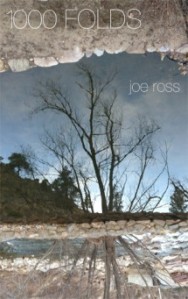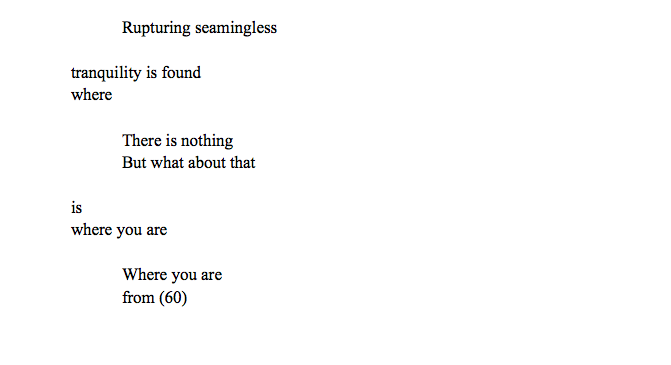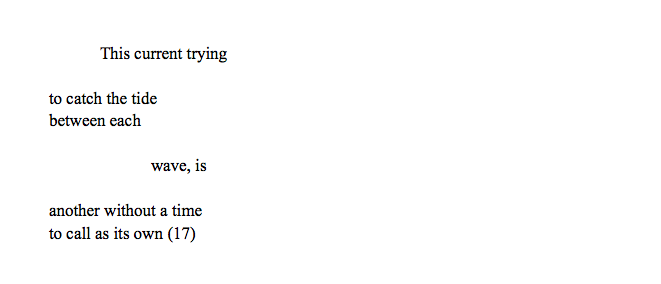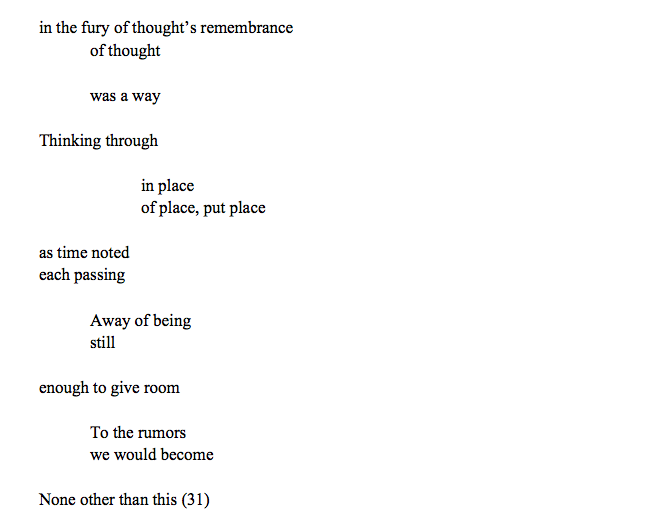REVIEW: 1000 Folds by Joe Ross
by Connor Fisher
1000 Folds, written by Joe Ross and published in 2014 by Chax Press, is a stark long poem that circulates around its subject matter and meditates on the nature of time, spatial objects, and the concept of becoming. The book is divided into three sections (in addition to a brief Prologue)—each section is formally similar to the others. Ross’ long poem comprises short, isolated lines that are presented traditionally: left justified (although many lines are indented) and read from top to bottom. The brief lines are paired most often into couplets, although groupings of three lines or individual lines are common as well. This separation of lines and couplets from one another provides percussive breaks of negative space within the otherwise constant flow of the poem. These interruptions provide a contrasting texture and lend an intentional temporary misdirection within the otherwise-linear movement of the page; a false sense of completion at the end of lines and stanzas jars and defamiliarizes the poem.
In the book’s final section, Ross writes,
This technique also allows Ross to elongate sentences or clauses down the length of a page; he enacts a temporal delay to stretch the time of the poem.
1000 Folds is primarily concerned with the concept of time—it situates the temporal as a circular force, rather than a linear projection. Through time’s agency, events recur and are never finally beyond the purview of either poem or poet (who functions as a suitable stand-in for any human subject). Time is a hollow; a gap that is inherently empty in order to be filled with various transitive events and interactions. Ross writes,
The constant flow of time dispossesses itself; the temporal is at once vehicle and vessel, yet contains nothing that does not slip away. Time’s complex nature constrains the book; it is an object that exists within time and that is read temporally, that establishes a specific lexicon to make certain arguments, and yet that must be discarded line by line as a reader makes her way through the pages.
In conjunction with the centrality of time to 1000 Folds, the book also concerns itself with the moment—an instant of time in which the impetus is placed on the individual to act or generate meaning and which would otherwise be a vacant space. Ross frequently describes temporal phenomena with spatial metaphors—this strengthens the poem’s conception of the temporal moment as an inhabitable space of opportunity and consequence.
The final concern of 1000 Folds is with the process and potential of becoming. Ross depicts becoming as an ethic that is entwined with time; temporal circularity does not alter the possibility—and necessity—for ontological change and development. Recurring moments indicate time’s ability to enact generation and alteration; this is at once for Ross a philosophical statement and an ethical call to seize what Ross terms “the clarity of becoming” (56). Earlier, he writes,
At the beginning of the excerpt, Ross asserts that thought, like time, moves in patterns of circularity and returns to find itself (“thought’s remembrance / of thought”) and enters into the play of being. Thought and time together implicate becoming (“Away of being / still” and “To the rumors / we would become”) and attest to its crucial placement both within the poem and within an ethic that allows individuals possibility and agency.
1000 Folds deftly advances Ross’ arguments and poetic strategy without resorting to didacticism or excessive abstraction. Rather, the book maintains a remarkable consistency and cohesive vision that blends together complex concepts and maintains momentum to a compelling conclusion. Ross has undertaken the ambitious project of outlining both a conceptual argument and a specific ethic, and 1000 Folds stands as a remarkable success of both poetic dexterity and philosophical complexity.
Connor Fisher was born in Albuquerque, New Mexico, and currently lives in Denver, Colorado. He has an MA in English Literature from the University of Denver and is working towards an MFA in Creative Writing—Poetry from the University of Colorado at Boulder.



